Overview
This article highlights essential books on PTSD that play a vital role in supporting trauma recovery and healing. These resources offer valuable insights and practical strategies, such as mindfulness and self-compassion, which are crucial for individuals navigating the complexities of trauma.
Have you ever felt overwhelmed by your past? These books can guide you through your journey, providing the tools needed for effective recovery.
As we explore this further, you'll discover how these strategies can foster a sense of safety and understanding, nurturing your path toward healing.
Introduction
In a world that is becoming increasingly aware of the profound effects of trauma and anxiety on mental health, specialized psychotherapy practices like The Emerald Couch in Denver, Colorado, are stepping up to provide tailored support for those in need.
Have you ever felt overwhelmed by your past? This practice emphasizes a holistic approach to healing, focusing on individual therapy sessions that address a wide array of mental health challenges, from obsessive-compulsive disorder to depression.
By employing a structured process that includes comprehensive assessments and personalized treatment plans, The Emerald Couch empowers clients to embark on their journey toward recovery.
With a commitment to evidence-based care and a strong belief in the importance of community support, this practice not only aims to help individuals recalibrate their lives but also fosters resilience and personal growth.
As we explore this further, it becomes clear that resources like The Emerald Couch are crucial in guiding individuals through their healing process, ensuring that they are more than just their past experiences.
The Emerald Couch: Tailored Psychotherapy for Trauma and Anxiety Recovery
At , in Denver, Colorado, we focus on helping adults navigate anxiety disorders through a holistic approach to mental well-being. Our commitment lies in assisting clients as they recalibrate, recover, and heal from past experiences. We offer customized one-on-one therapy sessions that address a variety of mental health issues, including trauma, anxiety, obsessive-compulsive disorder (OCD), depression, and we also provide recommendations for PTSD books.
Have you ever felt overwhelmed by your past? Our therapists at The Emerald Couch follow a proven process that begins with a comprehensive assessment, guiding you towards personalized treatment planning and education. This structured approach not only supports your healing journey but also empowers you to achieve your mental health goals. We believe that you are more than just your background; we emphasize whole-person care and promote personal development through expert therapeutic methods.
Current statistics reveal that a significant majority of individuals with anxiety disorders can benefit from professional care, highlighting the importance of accessible mental health resources. At The Emerald Couch, we reflect this statistic through our unwavering commitment to high-quality, evidence-based care, ensuring that you receive the attention and resources necessary for effective healing.
In the realm of healing, individualized psychotherapy plays an essential role. Understanding the impact of adverse experiences is crucial for effective mental health interventions, a concept explored in many PTSD books, and The Emerald Couch embodies this through our personalized support. We conduct thorough evaluations to accurately diagnose and address your needs, aligning with established criteria for comprehensive treatment plans.
Moreover, the significance of community support in healing cannot be overstated. As noted, "Individuals with greater community backing and financial resources are more capable of managing various sources of distress and possess the means to overcome such challenges when they arise." By helping you envision a life unburdened by the weight of your past, The Emerald Couch fosters resilience and growth, positioning itself as an invaluable resource for anyone prioritizing their mental health on the journey toward healing.
Additionally, we offer a variety of therapeutic approaches, including Eye Movement Desensitization and Reprocessing (EMDR) and Cognitive Processing Therapy (CPT), tailored to meet your unique needs. Both face-to-face and telehealth therapy options are available, ensuring flexibility in accessing care. If you’re ready to take the first step toward healing, we encourage you to reach out for a consultation and discover how we can support you on your journey.
The Body Keeps the Score: Brain, Mind, and Body in the Healing of Trauma by Bessel van der Kolk
In 'The Body Keeps the Score,' Bessel van der Kolk compassionately explores the intricate impacts of psychological distress on both the mind and body, drawing from decades of research and clinical experience. He clarifies how distress can fundamentally alter brain function and emotional regulation, making this book one of the invaluable PTSD books for those navigating the complexities of recovery.
Have you ever felt overwhelmed by your past? Recent studies suggest that psychological distress can lead to significant changes in brain activity, particularly in areas responsible for emotional regulation. EEG measures have shown abnormalities in children with PTSD, highlighting the profound effects of trauma. In PTSD books, Van der Kolk presents practical strategies for healing, including mindfulness, yoga, and other body-centered therapies, emphasizing the importance of addressing the physical manifestations of trauma.
Mindfulness, in particular, serves as a powerful tool for improving emotional regulation, self-awareness, and stress management. It enables individuals to observe their thoughts and feelings without judgment, fostering a nurturing environment for healing. This comprehensive approach not only serves as a cornerstone for therapists but also empowers survivors to reclaim their lives and cultivate resilience.
Techniques such as breath awareness and body scans can be seamlessly integrated into daily routines, providing ongoing . For instance, dedicating just a few minutes each day to mindful breathing can significantly assist in managing anxiety and enhancing focus.
As one anonymous individual insightfully noted, 'Treatment is what you make of it; some people just aren’t ready to get sober. However, if you are truly prepared to give healing an honest chance, this treatment is the ideal place to go.'
As we explore this further, consider the potential for transformation that lies within you. Healing is a journey, and seeking support is a courageous step towards reclaiming your peace and happiness.
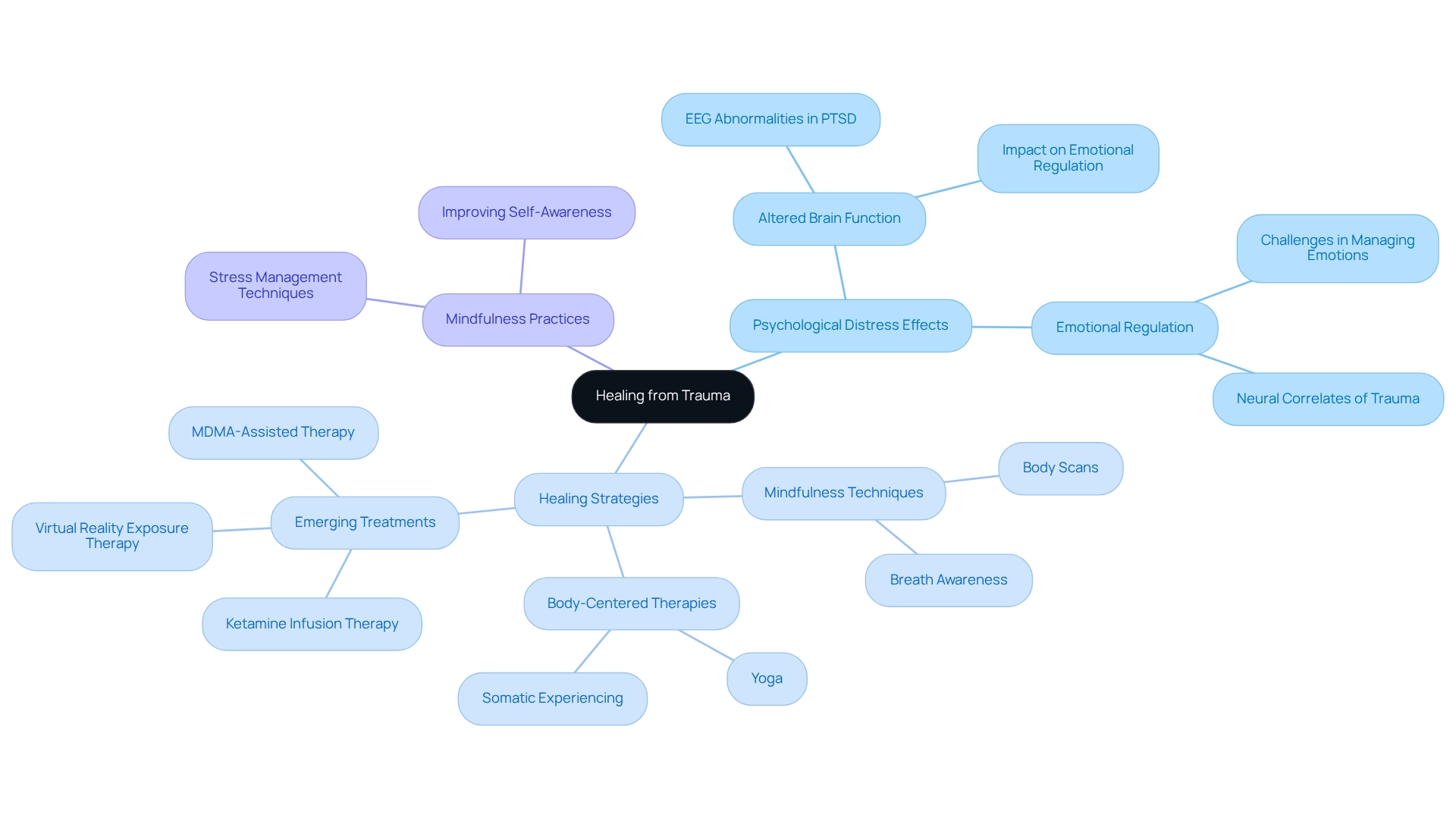
Healing the Trauma of Abuse: A Woman's Guide to Understanding, Healing, and Recovery by Mary Ellen Copeland
Mary Ellen Copeland's 'Healing the Trauma of Abuse' is among the invaluable PTSD books for women seeking to understand and heal from the effects of abuse. This comprehensive guide, along with , offers practical exercises and insights that empower readers to reclaim their lives and cultivate resilience.
Have you ever felt overwhelmed by your past? Copeland emphasizes the vital role of self-compassion in the healing journey, highlighting that nurturing kindness towards oneself can significantly enhance recovery outcomes, as noted in several PTSD books. Research shows that psychological abuse is a stronger predictor of PTSD in women than physical abuse, with 70% of those affected exhibiting PTSD symptoms. Furthermore, only 1% of women who experience forced sex seek professional help, highlighting the urgent need for accessible resources such as PTSD books like Copeland's.
Additionally, women who have faced intimate partner violence are nearly twice as likely to engage in problematic drinking, revealing the psychological impacts of distress that must be addressed in recovery, a topic discussed in PTSD books that also underscore the importance of community support in the healing process. Effective community support models, such as those that incorporate PTSD books, have demonstrated a remarkable improvement in healing rates among abuse survivors, providing a network of understanding and encouragement.
As we explore this further, recent discussions on [funding women's organizations to prevent violence against women and girls](https://unwomen.org/en/articles/facts-and-figures/facts-and-figures-ending-violence-against-women) highlight ongoing efforts to create supportive environments for survivors. Copeland's insights align with findings that emphasize the positive impact of community involvement on women's recovery from distress, reinforcing the idea that healing is often a shared journey.
'Healing the Trauma of Abuse,' among the important PTSD books, integrates mindfulness practices such as meditation, breath awareness, and body scans, serving as a vital tool for women navigating the complexities of emotional pain. This makes it a perfect complement to the holistic approach practiced at The Emerald Couch.
In seeking healing, remember that you are not alone; support is available, and your journey towards recovery is a meaningful one.
Complex PTSD: From Surviving to Thriving by Pete Walker
In 'Complex Trauma: From Surviving to Thriving,' Pete Walker emerges as a vital resource for those navigating the lasting effects of childhood trauma, as highlighted in . This user-friendly manual thoroughly details the signs linked to complex PTSD, which impacts around 1.5% of the population, and also recommends PTSD books that provide practical methods for healing.
Have you ever felt overwhelmed by your past? Walker emphasizes emotional regulation techniques and self-care practices that empower readers to reclaim their lives. He notes, "Gratitude feeling is deep and profound when it occurs," highlighting the emotional aspects of recovery and the importance of gratitude in the healing process. His compassionate approach not only aids in understanding the complexities of their experiences but also inspires a proactive stance toward healing. This book is one of the essential PTSD books, especially valuable for individuals who have faced prolonged trauma, guiding them on a transformative journey from mere survival to genuine thriving.
In addition to this, the integration of mindfulness practices, such as breath awareness and body scans, can significantly enhance emotional regulation and personal growth. Mindfulness techniques help individuals slow down, acknowledge their thoughts and feelings, and create space for healthier coping mechanisms.
The case study 'Staying Connected During Emotional Pain' illustrates the importance of maintaining connections during healing, emphasizing that staying connected while navigating pain fosters an environment of acceptance, helping clients learn healthier coping mechanisms. Furthermore, the clear operationalization of CPTSD has advanced the field, allowing for future treatment studies to examine different treatment needs, making this resource even more relevant for those seeking effective recovery strategies.
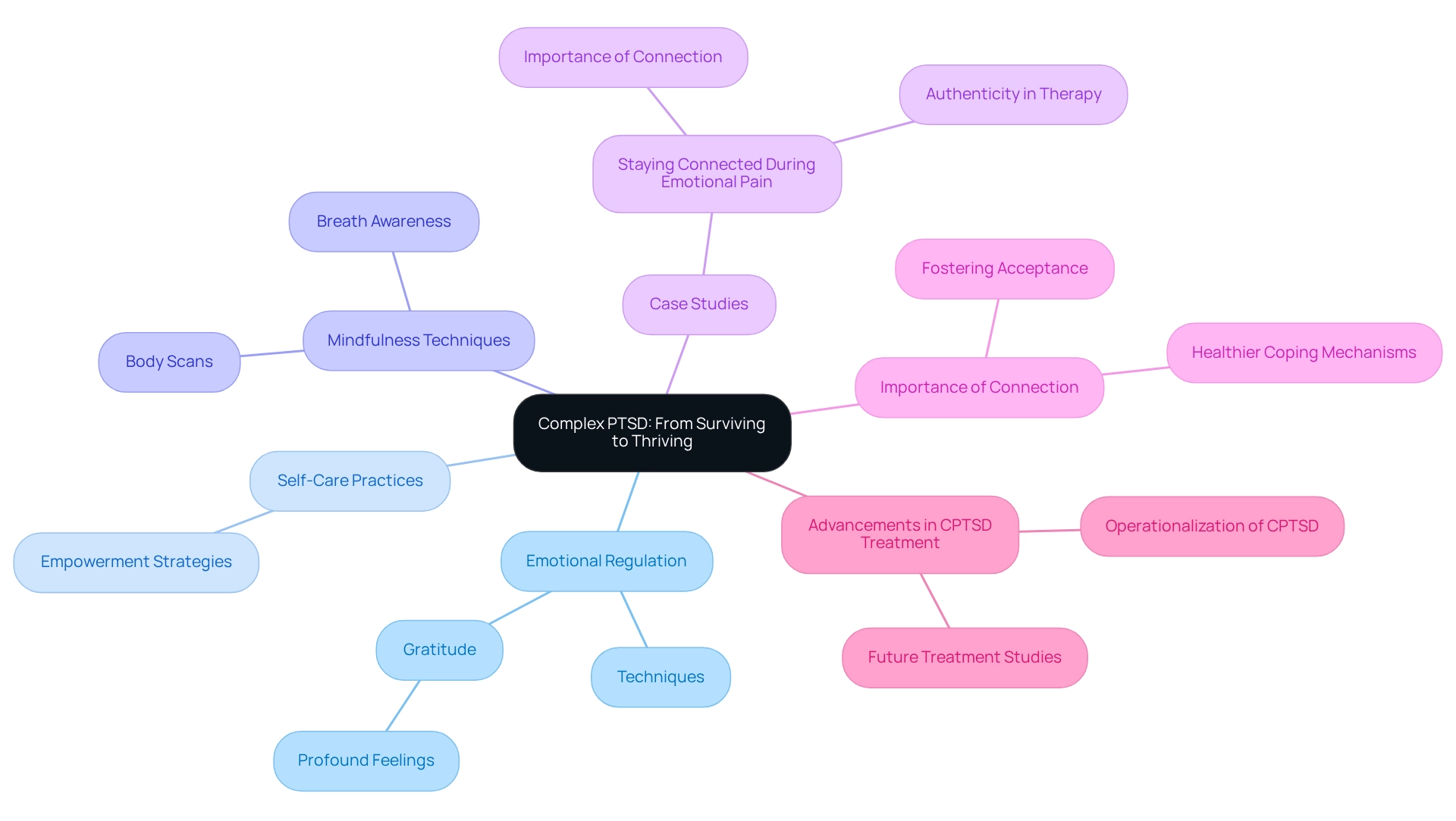
The Mindful Way Through PTSD: A Guide to Healing by Susan M. Orsillo and Lizabeth Roemer
In 'The Mindful Way Through Trauma,' Susan M. Orsillo and Lizabeth Roemer present a transformative approach to healing through mindfulness techniques. These practices are essential for enhancing self-awareness and emotional regulation, particularly at The Emerald Couch. Have you ever felt overwhelmed by your past? The authors offer practical activities designed to promote awareness and acceptance, which are crucial for effectively managing trauma-related symptoms. By emphasizing the importance of being present and nurturing a compassionate relationship with oneself, this book serves as an invaluable resource for individuals seeking to weave mindfulness into their trauma recovery journey, particularly in the context of PTSD books.
Research indicates that mindfulness-based interventions (MBIs) can significantly reduce symptoms of post-traumatic stress disorder. A meta-analysis reveals a medium effect size (SMD=0.41, p < .001), suggesting that these techniques may be as effective as second-line treatments like pharmacotherapy. Additionally, functional magnetic resonance imaging (fMRI) brain scans show that participants in mindfulness-based intervention groups exhibit significantly more connections between the default mode network and the dorsolateral prefrontal cortex and anterior cingulate cortex, further supporting the efficacy of these techniques.
A thorough umbrella review of 69 systematic reviews found that while 65.2% of the reviews lacked rigor, the remaining studies indicated a medium effect size for MBIs in alleviating trauma-related symptoms. This underscores the necessity for careful evaluation of research quality in this field. Grant Hilary Brenner, M.D., emphasizes the importance of recognizing when mindfulness is beneficial and when it may hinder healing, which is vital for addressing in our lives. As we explore this further, it becomes clear that 'The Mindful Way Through Trauma' is one of the important PTSD books that holds significant value in modern therapeutic practices, making it essential for those looking to enhance their recovery process.
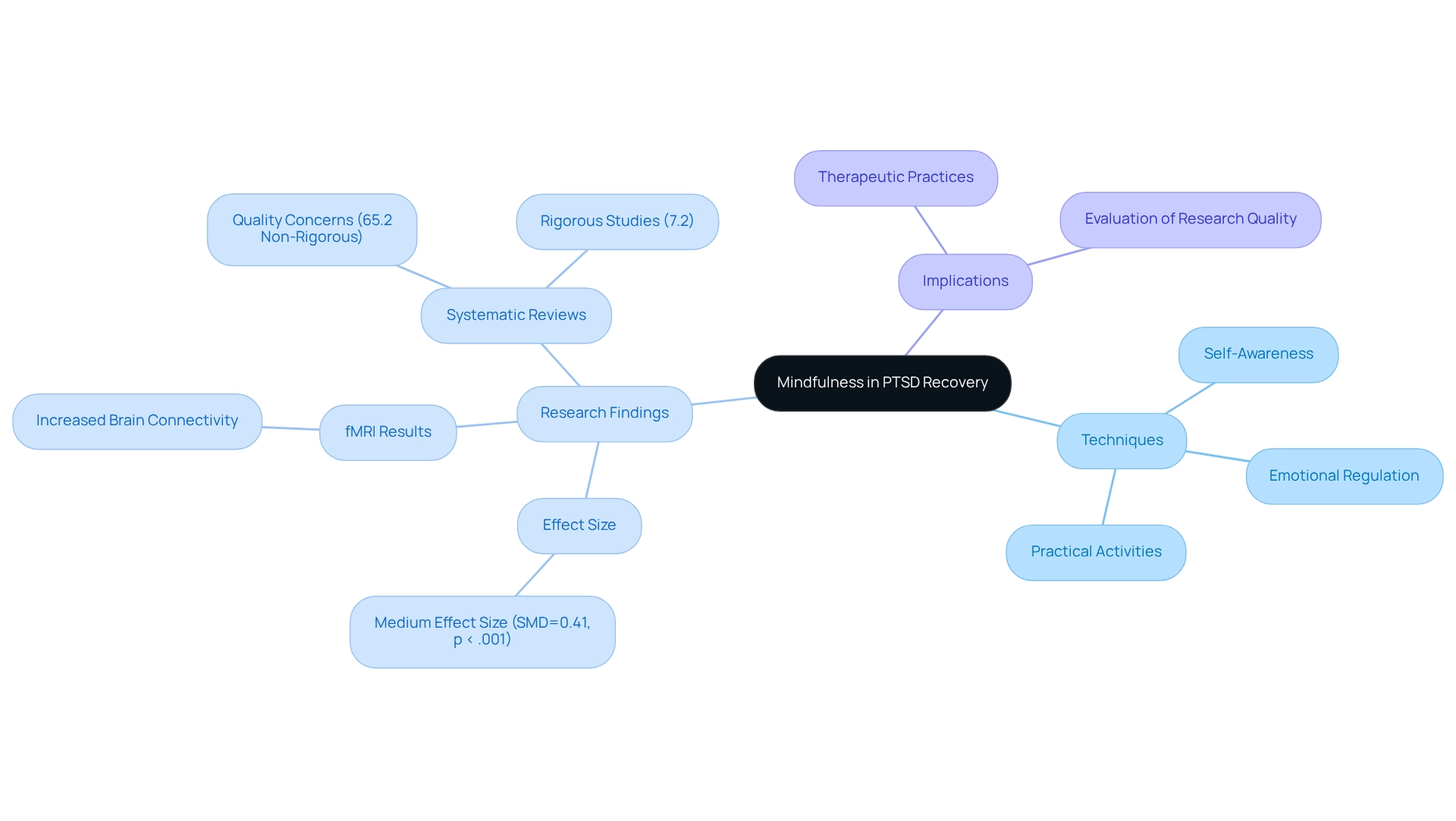
Post-Traumatic Stress Disorder: A Comprehensive Guide for Patients and Families by Matthew J. Friedman
Matthew J. Friedman's 'Post-Traumatic Stress Disorder: A Comprehensive Guide for Patients and Families' is one of the invaluable PTSD books for those seeking to understand post-traumatic stress disorder. This comprehensive guide, which is one of the essential PTSD books, gently explores the symptoms of PTSD, treatment options, and effective coping strategies, making complex information accessible to both patients and their families. Friedman's empathetic writing style encourages readers to confront the challenges associated with PTSD, emphasizing the essential role of education in the healing process. This aligns seamlessly with the holistic approach of The Emerald Couch, which highlights the importance of informed support and mindfulness practices in recovery.
The guide underscores the significance of family involvement in the recovery process, showcasing real-world examples of how loved ones can contribute to healing. Have you ever felt overwhelmed by your past? Many individuals with PTSD find it beneficial to share their experiences in peer support groups, fostering a sense of community and understanding. As our understanding of PTSD evolves, this guide, along with , remains a cornerstone for those impacted, offering essential insights into symptoms and available treatments in 2025. Notably, the guide addresses the timeline of symptoms related to this condition, noting that adjustment disorders typically begin within three months of a stressful event. Furthermore, the National Center for Post-Traumatic Stress Disorder highlights that veterans who served in combat areas are more prone to encountering this condition than those who did not, underscoring the wider effects of this issue among various groups. Additionally, the guide discusses PTSD books that explore new therapies for PTSD, including the possibilities of psychedelics and alternative treatments, demonstrating the evolving landscape of therapeutic choices. By incorporating mindfulness methods like breath awareness and body scans, readers can enhance their emotional regulation and self-awareness, further aiding their healing journey. By integrating these insights, Friedman's guide serves as a comprehensive resource for understanding PTSD and navigating the recovery process.
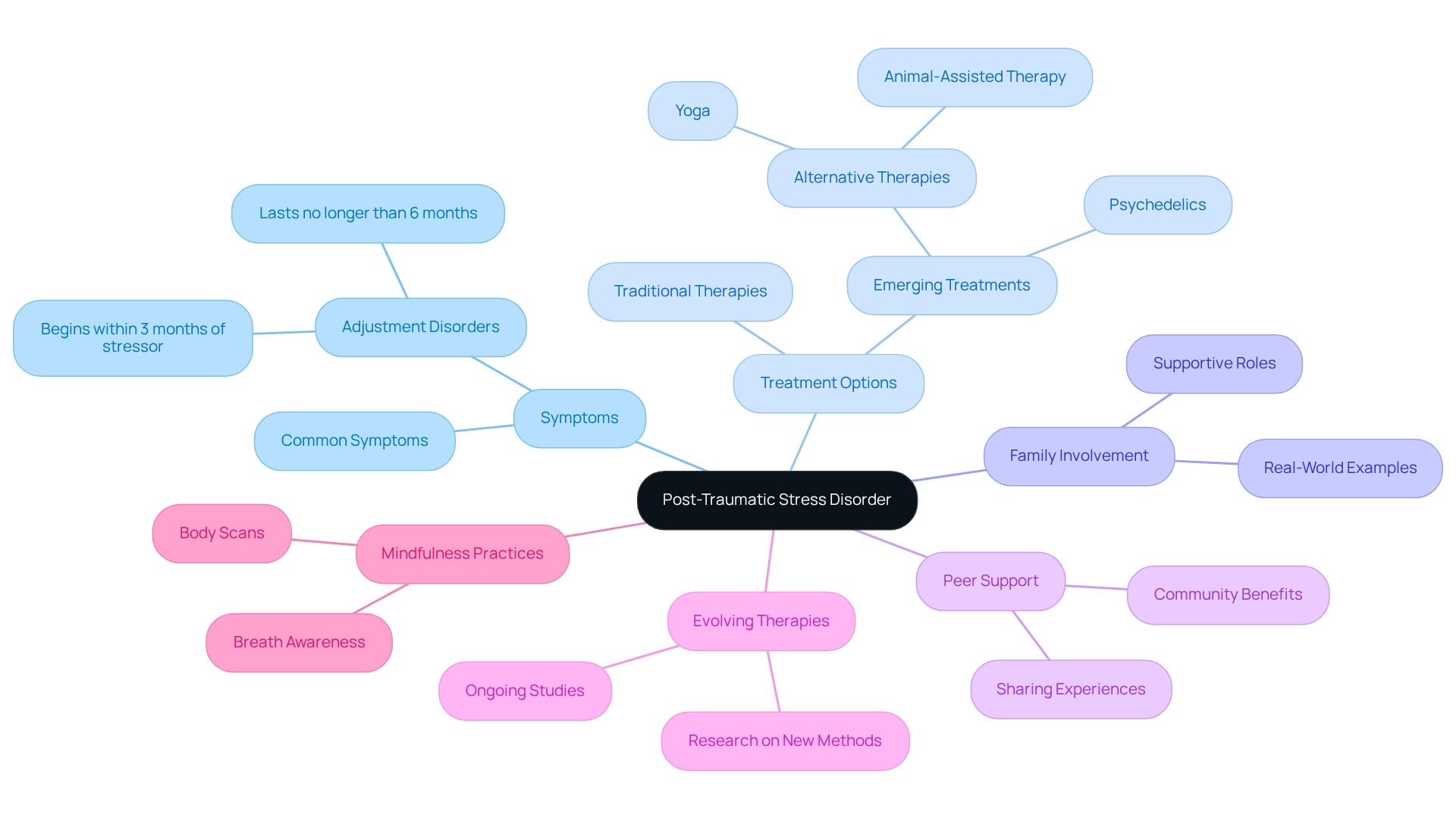
Addiction and Trauma: A Guide for Recovery by Dr. John F. Kelly
In 'Addiction and Trauma: A Guide for Recovery,' Dr. John F. Kelly delves into the complex relationship between psychological injury and substance use disorders. This vital resource reveals how traumatic experiences can trigger addiction, providing a comprehensive examination of the mechanisms involved. Kelly advocates for a dual-focus approach in treatment, highlighting the significance of addressing both emotional distress and addiction concurrently. This integrated care model not only enhances recovery outcomes but also resonates with the therapeutic philosophy at The Emerald Couch, where holistic healing is prioritized through practices like mindfulness.
Mindfulness serves as a powerful ally in this journey, fostering emotional regulation and personal growth for individuals recovering from distress. Techniques such as meditation and mindful breathing can greatly assist individuals in managing their emotions and responses more adeptly. For instance, consider Janet's experience: her counselor facilitated referrals and support for her post-traumatic stress, showcasing the effectiveness of integrated treatment for co-occurring stress and addiction. Furthermore, the average state and trait anxiety scores of 53.0 and 61.1, respectively, highlight the substantial emotional challenges faced by those in recovery. Kelly also discusses Posttraumatic Growth, a process where individuals with trauma experience significant development through their challenges, reinforcing the belief that healing is indeed possible.
Moreover, a thorough evaluation of childhood adversity in treatment planning for those with substance use disorder and PTSD is crucial for understanding the complexities of care. By offering practical strategies for individuals navigating these intertwined challenges, including mindfulness techniques, Kelly's work is one of for those seeking to reclaim their lives and cultivate resilience in the face of adversity. Have you ever felt overwhelmed by your past? Remember, you are not alone, and support is available to help you on your path to healing.
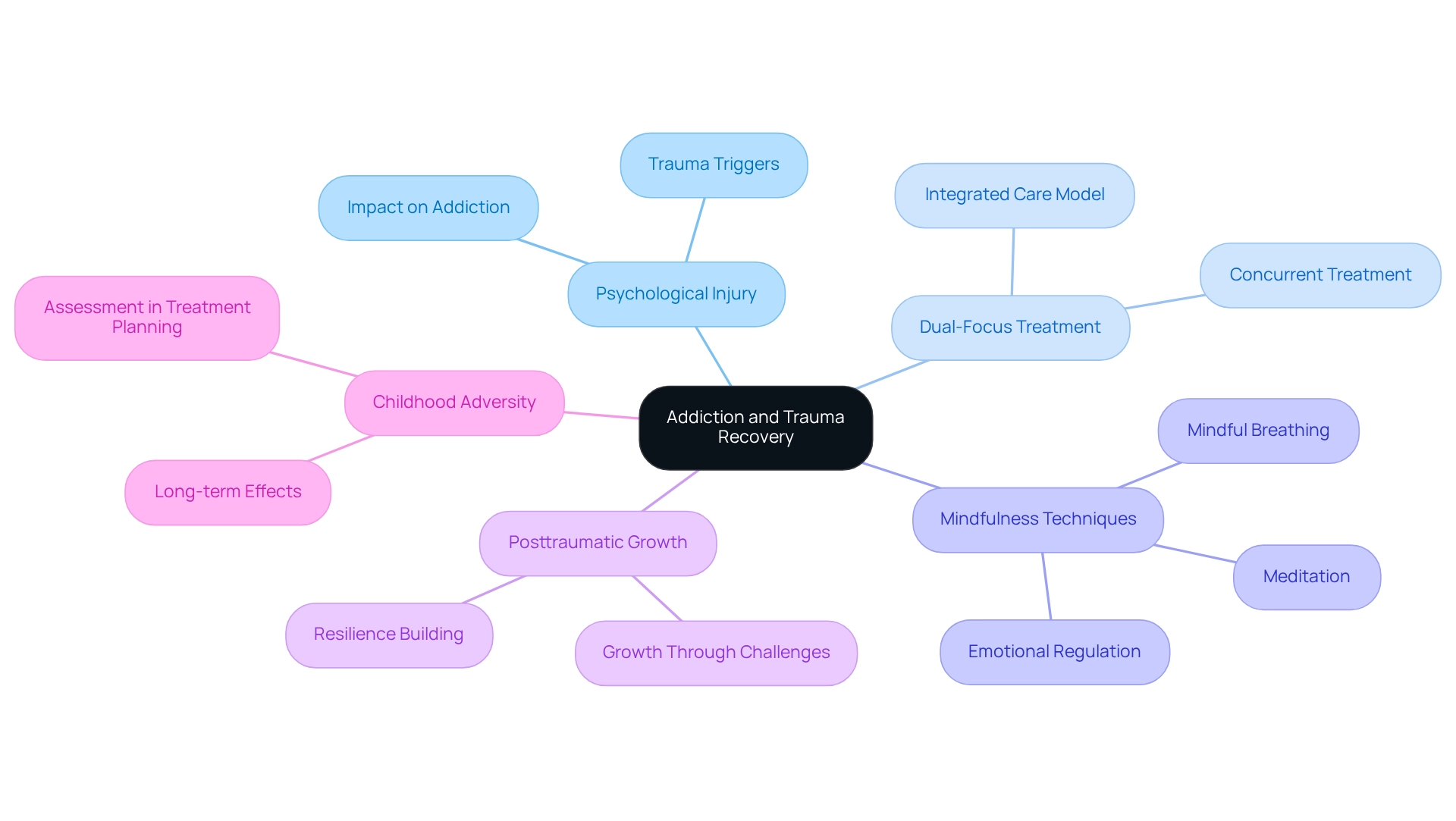
Writing to Heal: A Guided Journal for Recovering from Trauma by James W. Pennebaker
James W. Pennebaker's 'Writing to Heal' offers a transformative method for recovery from distress through organized journaling activities. This approach can be especially helpful for individuals grappling with emotional struggles and OCD. The book emphasizes the significant influence of expressive writing on processing emotions and experiences related to distress. Pennebaker provides readers with a series of guided prompts designed to facilitate self-reflection and emotional exploration. This makes PTSD books an essential resource for trauma survivors aiming to articulate their feelings and promote healing.
Research shows that expressive writing can significantly enhance emotional well-being, and many PTSD books highlight how this practice can lead to reduced symptoms of PTSD and improved psychological resilience. The therapeutic power of writing is further underscored by Pennebaker's insights. He suggests that as individuals engage in reflective writing, they not only confront their past but also envision a more positive future. This aligns seamlessly with the holistic approach of The Emerald Couch, which emphasizes the significance of personal development and healing—especially for overachievers who may struggle with prioritizing their needs over work or family.
By collaborating with The Emerald Couch, clients can gain a deeper understanding of their thought patterns and behaviors associated with OCD. This understanding enables them to create more effective coping strategies, focusing on their well-being.
Case studies, like 'Writing for Future Change,' demonstrate how writing can empower individuals to formulate actionable plans for transformation, nurturing hope and agency in their lives. For instance, this case study motivates individuals to utilize writing as a means to imagine and prepare for positive changes, emphasizing , and suggests the use of PTSD books.
Integrating journaling as a therapeutic resource is backed by current research, which continues to investigate its effectiveness in trauma healing. Pennebaker's exercises encourage individuals to delve into their experiences, ultimately aiding in the healing process. By embracing expressive writing, clients at The Emerald Couch can cultivate a deeper understanding of their emotions, paving the way for resilience and healing.
As Pennebaker notes, 'The reality is that the data are fairly convincing that people as they get older become more positive and less self-absorbed,' highlighting the potential for growth through reflective practices. By incorporating these insights and statistics, the advantages of expressive writing are further confirmed, strengthening its role as a powerful resource in healing.
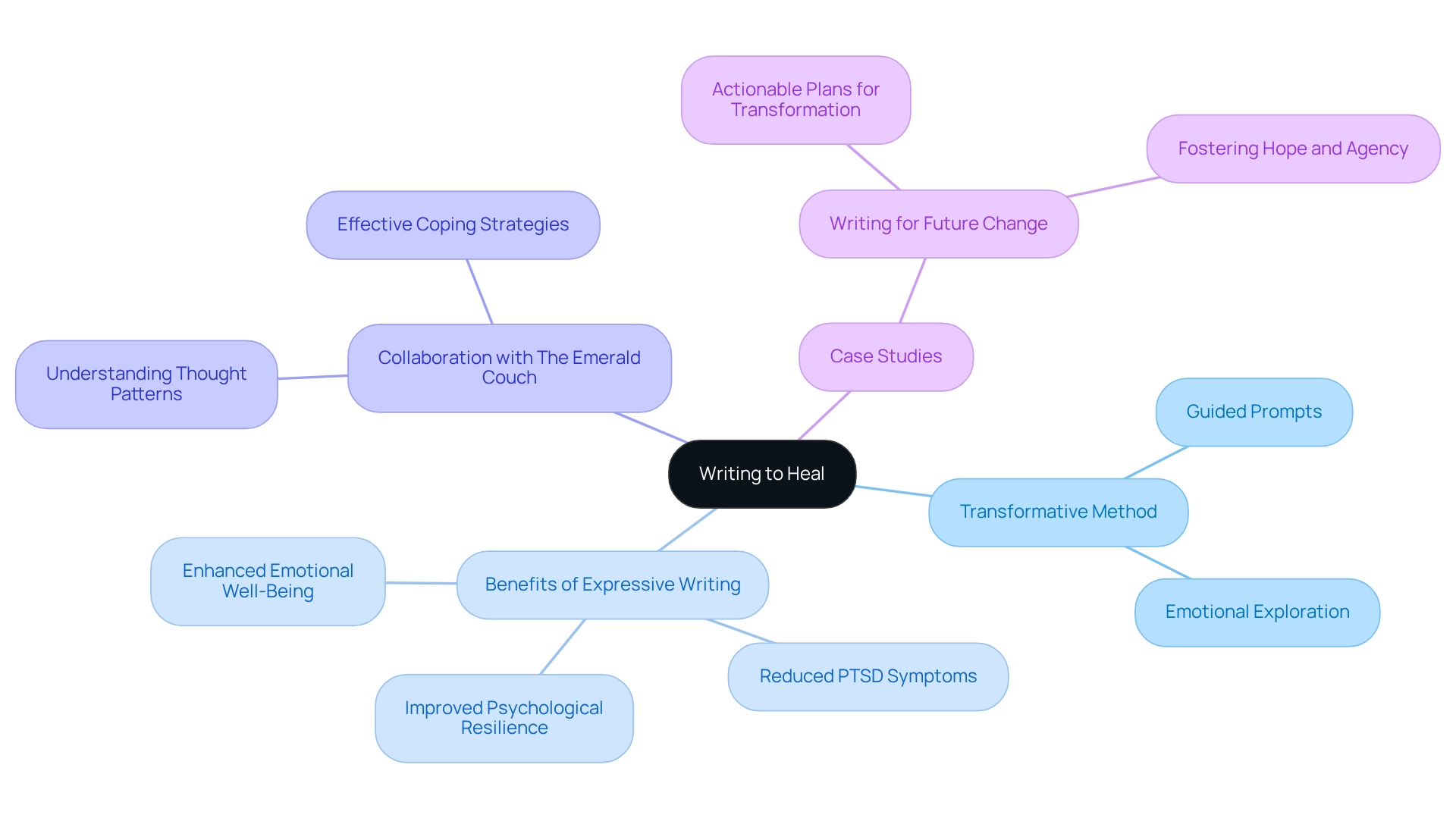
The Trauma Recovery Workbook: A Guide for Survivors by Dr. John D. McGowan
Dr. John D. McGowan's 'The Trauma Recovery Workbook' serves as a vital tool for survivors aiming to actively engage in their healing process. This workbook is rich with exercises and methods designed to enhance self-awareness, emotional regulation, and resilience—essential components for successful healing. McGowan's practical approach empowers readers to take ownership of their healing journey, making it an invaluable resource for navigating the complexities of trauma.
Have you ever felt overwhelmed by your past? Incorporating mindfulness practices, such as meditation, breath awareness, and body scans, can further enhance the workbook's effectiveness. These techniques invite individuals to slow down and observe their thoughts and feelings without judgment, fostering a deeper understanding of their emotional landscape. This approach aligns with the therapeutic methods at The Emerald Couch, where a holistic strategy is adopted to assist clients in their healing.
Moreover, studies show that committed multidisciplinary rehabilitation groups greatly enhance results for injury survivors, underscoring the importance of comprehensive rehabilitation services. A study on emotional healing reported a Cohen’s d effect size of 0.37 for PTSD and 0.67 for depression, indicating a moderate to strong influence of organized healing efforts on .
The workbook's emphasis on actionable strategies resonates deeply with the core values at The Emerald Couch, where fostering self-awareness is a cornerstone of healing. By integrating mindfulness techniques into their recovery, survivors can cultivate resilience and develop effective coping mechanisms, ultimately paving the way for a more fulfilling life. As one participant expressed, "I have hope that I can finally develop the ability to manage and cope and have a better life." This sentiment reflects the transformative potential of engaging with resources like McGowan's workbook and other ptsd books, which align with the broader movement towards trauma- and violence-informed care. This approach considers the social, cultural, and historical contexts of trauma, enhancing the effectiveness of the workbook's strategies in real-world applications.
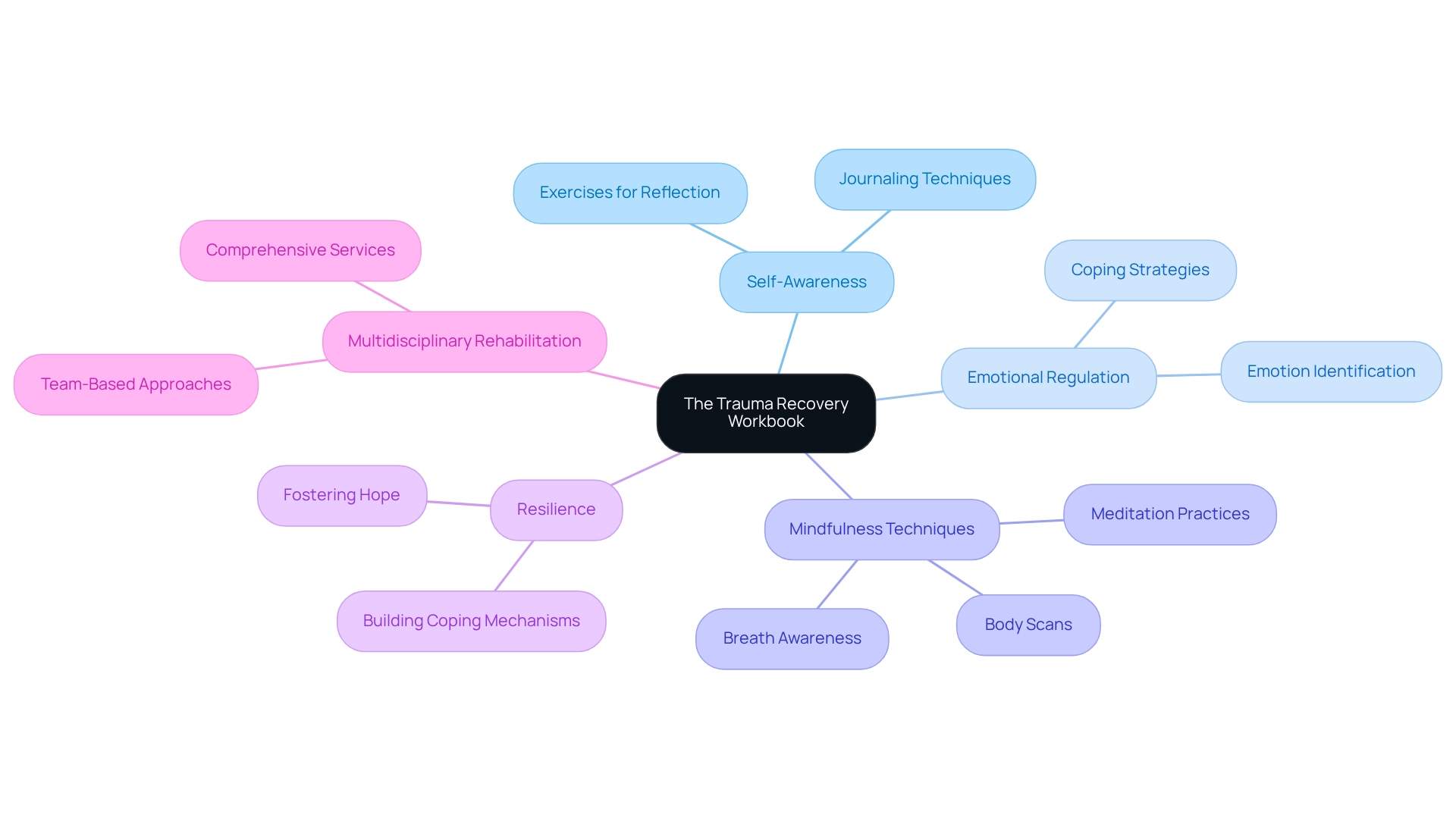
Conclusion
The Emerald Couch stands as a beacon of hope for those grappling with trauma and anxiety, offering a tailored approach that emphasizes holistic healing and individual empowerment. By combining comprehensive assessments with personalized treatment plans, this Denver-based practice ensures that each client receives the necessary support to navigate their unique challenges, whether they stem from obsessive-compulsive disorder, depression, or traumatic experiences.
Have you ever felt overwhelmed by your past? The importance of community support and evidence-based care cannot be overstated in the journey toward recovery. Resources like The Emerald Couch not only provide therapeutic interventions but also foster resilience and personal growth, allowing individuals to envision a life beyond their past. The incorporation of various therapeutic modalities, including mindfulness and expressive writing, further enhances the healing process, making recovery not just possible but a transformative experience.
Ultimately, the work done at The Emerald Couch underscores the vital role of specialized psychotherapy practices in addressing mental health challenges. By prioritizing a holistic and individualized approach, this practice exemplifies how accessible mental health resources can empower individuals to reclaim their lives and thrive in the face of adversity. As society continues to acknowledge the profound impact of trauma on mental health, it is crucial to support and engage with practices that champion comprehensive recovery, ensuring that everyone has the opportunity to heal and grow.
Frequently Asked Questions
What is the focus of The Emerald Couch psychotherapy practice?
The Emerald Couch focuses on helping adults navigate anxiety disorders through a holistic approach to mental well-being, assisting clients in recalibrating, recovering, and healing from past experiences.
What types of therapy does The Emerald Couch offer?
The Emerald Couch offers customized one-on-one therapy sessions that address various mental health issues, including trauma, anxiety, obsessive-compulsive disorder (OCD), depression, and recommendations for PTSD books.
How does The Emerald Couch approach the healing process?
The healing process at The Emerald Couch begins with a comprehensive assessment, which guides personalized treatment planning and education, empowering clients to achieve their mental health goals.
Why is professional care important for individuals with anxiety disorders?
Current statistics show that a significant majority of individuals with anxiety disorders can benefit from professional care, highlighting the need for accessible mental health resources.
What therapeutic approaches are available at The Emerald Couch?
The Emerald Couch offers various therapeutic approaches, including Eye Movement Desensitization and Reprocessing (EMDR) and Cognitive Processing Therapy (CPT), tailored to meet individual needs.
Are there options for therapy delivery at The Emerald Couch?
Yes, The Emerald Couch provides both face-to-face and telehealth therapy options, ensuring flexibility in accessing care.
What is the significance of community support in the healing process?
Community support plays a crucial role in healing, as individuals with greater community backing and financial resources are more capable of managing distress and overcoming challenges.
What insights does Bessel van der Kolk provide in "The Body Keeps the Score"?
In "The Body Keeps the Score," Bessel van der Kolk explores the impacts of psychological distress on the mind and body, emphasizing the importance of addressing the physical manifestations of trauma through strategies like mindfulness and yoga.
How does Mary Ellen Copeland's book, "Healing the Trauma of Abuse," contribute to understanding PTSD?
Copeland's book provides practical exercises and insights for women seeking to understand and heal from the effects of abuse, emphasizing self-compassion and the importance of community support in recovery.
What role does mindfulness play in healing according to the articles discussed?
Mindfulness serves as a powerful tool for improving emotional regulation, self-awareness, and stress management, enabling individuals to observe their thoughts and feelings without judgment, which fosters a nurturing environment for healing.




